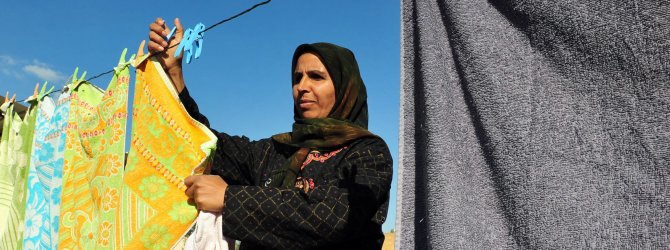-
Beyond the Horizon: A Long-term Development Agenda for ...
Beyond the Horizon: A Long-term Development Agenda for the WANA Region. Part One: Three Key Initiatives on Reform, Law, and Women

Even as winds of war, instability and stagnation buffet much of West Asia and North Africa (WANA), we need to think about current and future steps for meeting the development challenges confronting the region. Security concerns will dominate some discussions for the foreseeable future. But we also must peer beyond the horizon. Fresh ideas springing up within the region or adapted from abroad can point the way to positive change.
Some such ideas are emerging from the WANA Institute’s recent opinion pieces, starting with HRH Prince El Hassan bin Talal’s overarching call for “a new and inter-disciplinary approach to development”.
My own contribution partly takes account of these articles’ insights, my work in the region and beyond, and other resources such as the Arab Human Development Reports. Building on these factors, I draw on international experience to suggest a potential development agenda for WANA.
A crucial caveat here is that what works in one region or country does not necessarily succeed in another. But my point is not to dictate an absolutist list. Instead, I simply suggest steps that international agencies, governments, NGOs, policy institutes, and other concerned actors should explore in various ways in various countries comprising WANA.
The development agenda I suggest comprises two separate papers. This first paper proposes: a commission that highlights overall reform and reconstruction; an initiative that focuses the use of law and rights specifically to benefit the poor, the disadvantaged, and other populations; and an initiative to benefit women in particular and (through them) the region more generally. The second paper, subtitled “Strategic Steps to Advance Reform,” proposes a series of complementary approaches and activities.
With that said, here are the three recommended initiatives:
WANA Commission on Long-term Recovery and Reform. The Commission (comprising reformist leaders, with substantial representation for women) would peer over the horizon of the problems plaguing the region, to craft recommendations for long-term strategies for recovery and reform. It would in part draw on the work of the Legal and Women’s Empowerment Initiatives discussed below. But it also would take many other factors into consideration.
Looking both within and beyond WANA, the Commission would explore a wide variety of research and experiences. These could include, for example, the work of: the U.N. High Commissioner for Refugees, ranging from promoting inter-ethnic cooperation in Tajikistan to supporting university-based legal aid immigration clinics in Central and Eastern Europe; various organizations’ efforts to educate and otherwise build refugee capacities, so they can contribute to their societies once situations stabilize; the U.N. Transitional Authority in Cambodia, which helped launch NGOs that have played important legal education and advocacy roles; the Open Society Foundations, which pursued refugee and other programs that helped pave the way for progress once Myanmar experienced a political opening; international NGOs, such as the Carter Center in Liberia and Penal Reform International in Malawi, which have built up successful country-specific partner organizations assisting the disadvantaged; the World Bank’s Justice for the Poor Program, which has researched grassroots justice efforts; and certain countries’ post-trauma truth and reconciliation commissions, international tribunals, and other efforts that have taken diverse approaches to bolstering stability and justice.
WANA Legal Empowerment Initiative. Legal Empowerment features people’s use of law and rights to access government services and justice systems, obtain identify papers, enhance women’s status, reduce poverty, combat corruption, and otherwise improve the quality of their lives. It thus contributes not just to these important goals, but to a society’s long-term stability. As such, “empowerment” should be seen not as a threat but instead as a vehicle for constructive reform and recovery. Furthermore, legal empowerment efforts (often springing from civil society) have proven effective even in the face of dysfunctional government institutions; rather than awaiting improvements in government operations, legal empowerment can spur them. The U.N. Secretary-General and General Assembly have accordingly endorsed the concept. A growing array of research from the World Bank, the U.K Department for International Development, the Overseas Development Institute, the International Development Law Organization, the Asia Foundation, the Asian Development Bank, and other sources demonstrates its efficacy.
The proposed Legal Empowerment Initiative would comprise a Legal Empowerment Fund and a Legal Empowerment Policy Group. The Fund would finance demonstration projects, evidence-based research, conferences, exchanges, and other activities concerning legal empowerment impact and lessons. The Policy Group (consisting of leading policy institute, NGO, academic, and other reformist personnel) would oversee the Fund and otherwise collect, support, and disseminate relevant evidence-based research from within and beyond WANA. Its findings and recommendations would be tailored to specific societies and situations. Some steps could involve immediate action; others could await implementation until conditions permit.
WANA Women’s Empowerment Initiative. A mountain of international evidence indicates that it is not just women who benefit from programs that improve their status and well-being, as crucial as those goals are. Rather, their societies as a whole profit, in terms of economic performance, children’s health and education, and a host of other indicators. One reason that parts of WANA lag behind other regions – and arguably one underlying cause of its instability – is that women play a lesser role in decision-making at most levels of society and governance.
The proposed Women’s Empowerment Initiative would address the challenges and opportunities flowing from this state of affairs. Its structure would mirror that of the Legal Empowerment Initiative, in terms of featuring both a Fund and a Policy Group, with the latter mainly comprising leading reformist women from WANA. The Initiative would examine the economic, political, social, legal, and other constraints facing females in the region, as well as activities and strategies being used to overcome them. While there might be some limited overlap with the Legal Empowerment Initiative, this should be seen as a source of synergy. And while there is already a range of effective, courageous organizations working with women in WANA, the Women’s Empowerment Initiative would not compete with them. It would instead pursue funding, political support, and research to help sustain and strengthen them.

